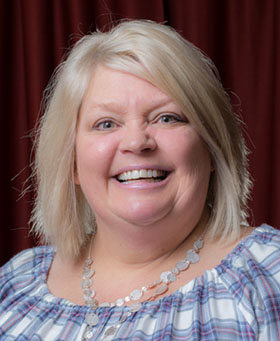Associate Professor, Human Development and Relationships Educator
Division of Extension | Juneau
Hometown: Menasha, WI
Patricia Carroll is an Associate Professor in the Division of Extension, Department of Family Development. Carroll programs in the area of Human Development and Relationships with an emphasis in digital parenting outreach and engagement. She is a leader in the development, evaluation, and execution of educational programs that strengthen families and communities.
Talks:
The Importance of Parental Confidence
Science tells us that, when parents stop believing in themselves as parents, they can become less effective at child rearing. Self-efficacy is not a fixed trait. It is possible to strengthen one’s parenting efficacy. This talk provides tips to help promote effective parenting practices that build parental confidence and stronger parent-child relationships.
Laugh Lines: The Science and Soul of Humor in Relationships
In a world that often feels heavy, humor offers a lifeline—not just for stress relief, but for deeper connection. Laugh Lines explores how laughter strengthens relationships across life stages, from parenting to partnerships to friendships. Blending research from psychology and family studies with real-life stories and a touch of wit, this engaging session reveals how humor fosters empathy, builds resilience, and helps us navigate both the mundane and the messy moments of life.
Participants will discover the science behind humor’s impact on emotional regulation, communication, and bonding, while gaining practical tools to bring more joy into their relationships. Whether you’re a parent, partner, sibling, or friend, this talk will leave you smiling—and inspired to laugh a little more often.
Topic: Laugh Lines: The Science and Soul of Humor in Relationships
Audience: Parents, couples, educators, caregivers, workplace teams
Format: Keynote, workshop, or breakout session
Length: 45–90 minutes
Takeaways:
- Understand how humor supports emotional and relational health
- Learn practical ways to use humor in everyday interactions
- Explore the role of humor in resilience and stress management
- Reflect on personal stories and shared laughter as tools for connection
The Science of Connection: What Research Says About Strong Families
Strong families aren’t built by accident; they’re shaped by intentional habits and everyday choices. This engaging session explores the science behind family cohesion, communication, and adaptability. Drawing from family systems theory and decades of research, participants will learn how emotional bonding, shared rituals, and open dialogue contribute to lasting family strength.
Whether you’re a parent, caregiver, educator, or community leader, this talk offers practical strategies to nurture connection and resilience within families of all shapes and sizes.
Audience: Parents, caregivers, educators, family service professionals
Format: Keynote, workshop, or breakout session
Length: 45–90 minutes
Takeaways:
- Understand the key components of strong family systems
- Learn how rituals and routines build emotional bonds
- Explore communication strategies that foster trust and adaptability
- Apply research-based tools to strengthen family relationships
Bridging the Gap: Navigating In-Law and Extended Family Dynamics
In-law and extended family relationships can be a source of deep connection—or ongoing tension. This insightful session explores the common challenges families face, including boundary ambiguity, value differences, and communication breakdowns. Participants will gain tools to foster understanding, set healthy boundaries, and build respectful relationships across generations.
Whether you’re newly married, part of a blended family, or navigating long-standing dynamics, this talk offers practical strategies for creating harmony without losing your voice.
Audience: Couples, parents, family service professionals, community groups
Format: Keynote, workshop, or breakout session
Length: 45–90 minutes
Takeaways:
- Understand the psychology of in-law and extended family relationships
- Learn strategies for setting boundaries and managing expectations
- Explore communication tools for reducing conflict and building empathy
- Apply research-based insights to strengthen family harmony
